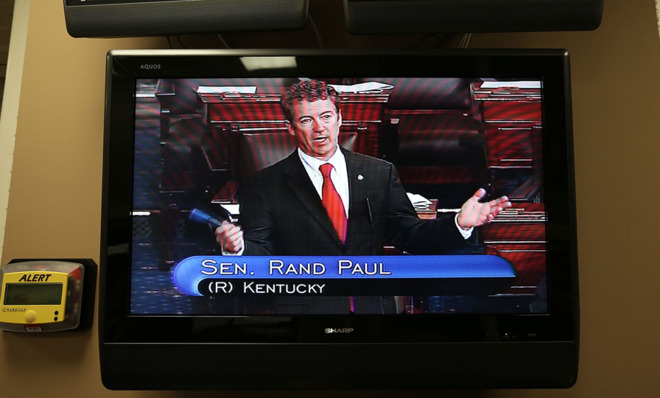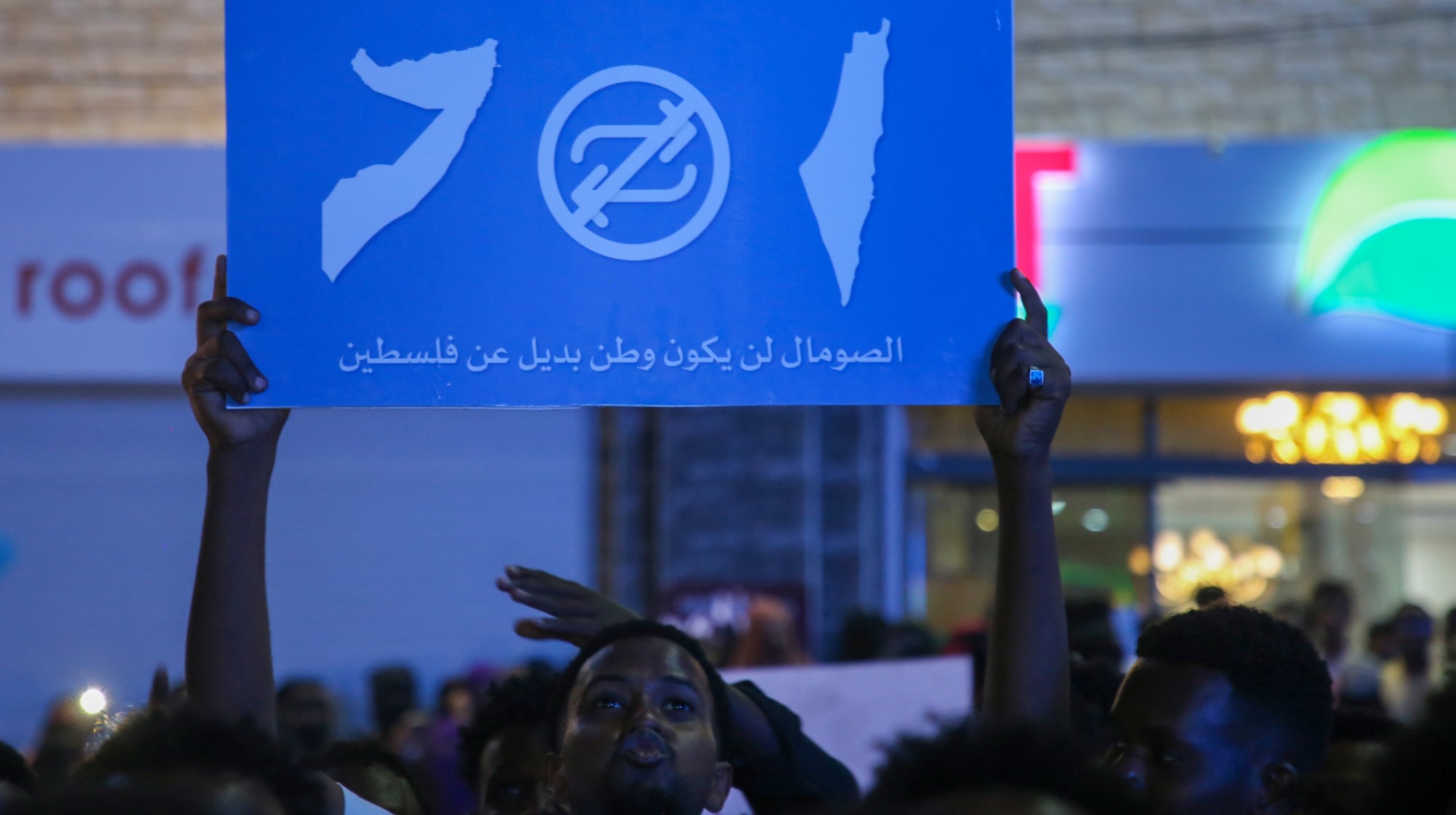Why you should take Rand Paul's latest stand on drones seriously
The Tea Party darling has a history of holding up nominations to protest drone warfare. This time, he has a point.


It remains the most memorable moment of Sen. Rand Paul's (R-Ky.) young career in Congress: a 13-hour talking filibuster in 2013 to stall the nomination of John Brennan as director of the CIA. But it was more publicity stunt than a principled stand of much purpose; Paul was merely seeking the answer to a narrowly crafted question about the use of drones in the United States, and Brennan easily won confirmation anyway.
Now, Paul is holding up another nomination, this time that of David Barron, a former lawyer with the Office of Legal Counsel at the Department of Justice, to the 1st Circuit Court of Appeals in Boston. And this time, the move is much more than a stunt.
Eleven years ago, the Senate confirmed Jay Bybee to a lifetime appointment on the 9th Circuit Court of Appeals in San Francisco. At the time, almost no senators knew about — much less had reviewed the contents of — a set of memos authorizing torture that Bybee had signed when he was head of the OLC in 2002. Paul is trying to prevent similarly rewarding Barron before senators can review the legal arguments he made authorizing another troubling executive branch action: killing an American citizen with no due process.
The Week
Escape your echo chamber. Get the facts behind the news, plus analysis from multiple perspectives.

Sign up for The Week's Free Newsletters
From our morning news briefing to a weekly Good News Newsletter, get the best of The Week delivered directly to your inbox.
From our morning news briefing to a weekly Good News Newsletter, get the best of The Week delivered directly to your inbox.
Barron, who is currently a Harvard Law School professor, served as the acting head of the OLC from 2009 until 2010. The office provides legal advice to executive branch agencies that can provide (usually secret) legal sanction for controversial positions.
A July 16, 2010, memo written by Barron authorizing the drone killing of Anwar al-Awlaki, the extremist Yemeni-American cleric, is one such opinion. Awlaki died in a CIA drone strike (along with Samir Khan, another American citizen who had become an extremist propagandist) on Sept. 30, 2011.
Well before his death, at least one member of Congress — Sen. Ron Wyden (D-Ore.), a member of the Senate Intelligence Committee — unsuccessfully attempted to learn the legal rationale for putting Awlaki on a kill list. In a letter to Attorney General Eric Holder sent in February 2012, Wyden said he had been asking for the legal justification for killing Awlaki "for more than a year." Wyden's efforts set off a four-year battle for Congress to see that OLC memo — a process that has met with only partial success.
In the days after Awlaki's killing, Senate Judiciary Committee Chair Pat Leahy (D-Vt.) and ranking member Chuck Grassley (R-Iowa) complained they hadn't seen the memo. In February of last year, Wyden threatened to hold John Brennan's nomination to the CIA; as a result, the House and Senate Intelligence Committees and the Senate Judiciary Committee received the memo.
A free daily email with the biggest news stories of the day – and the best features from TheWeek.com
Eventually, at least 31 members of Congress made at least 23 attempts to obtain the memo permitting the executive branch to kill an American citizen with no due process. Most of Congress still hasn't seen it.
Which brings us to Paul's attempt to obtain the memo before the full Senate votes on Barron's nomination.
Barron's nomination to the First Circuit was voted out of the Senate Judiciary Committee — which has seen the drone memo — on a party line vote on Jan. 16. His nomination may come up for a vote in the next few weeks.
On April 30, as first reported by The Hill, Paul informed Senate Majority Leader Harry Reid (D-Nev.) that he will place a hold on Barron's full Senate confirmation until the Department of Justice makes the memo public.
Paul may have the courts on his side. He invoked an April 21 decision by New York's 2nd Circuit Court of Appeals that the government must release a redacted version of the memo to the ACLU and two New York Times reporters who had sued in 2011 to enforce a Freedom of Information Act request for the memo. The court order makes it easier to for Paul to call for a public release, rather than just a release to Congress.
"Until now," Paul wrote of the court order, "the American people have been unable to scrutinize the administration's legal basis" for killing Awlaki. Disclosing the memo, Paul continued, "will also allow the Senate to gain critical insight into David Barron's judicial philosophy."
It's unclear how the hold will work under the Senate's new filibuster rules, which require only a majority to move a nomination forward for a vote. If Paul doesn't have the support of at least a few Democrats, Reid can go ahead anyway. But unlike Paul's quixotic filibuster of Brennan, this effort may draw broader support. In the past, members of Congress as diverse as Rep. Barbara Lee (D-Calif.) and Sen. Mike Lee (R-Utah) have pushed for release of the memo. That the Department of Justice has refused to do so on an issue as momentous as the killing of an American citizen presents real concerns about separation of powers.
Furthermore, unlike Bybee's earlier confirmation battle, senators are at least aware of the drone memo. In addition, a white paper roughly outlining the thinking behind the memo was first leaked and then officially released in response to a FOIA last year.
And even senators who have seen the drone-killing memo have questions about the limits it places (or lack thereof) on the executive's power to kill Americans. Wyden, along with fellow Senate Intelligence Committee members Martin Heinrich (D-N.M.) and Mark Udall (D-Colo.), wrote last November that "the limits and boundaries of the president's power to authorize the deliberate killing of Americans need to be laid out with much greater specificity."
Four years ago, David Barron opened a Pandora's box, giving presidents an inadequately limited authority to kill Americans outside all normal judicial process. As Paul notes in his letter, it would simply be "irresponsible" for the Senate to confirm his nomination without discovering what the memo could reveal about his views on due process, civil liberties, and international law. In a letter to all 100 senators, the ACLU echoed this language, recalling the precedent of Jay Bybee. "No senator can meaningfully carry out his or her constitutional obligation to provide 'advice and consent' on this nomination to a lifetime position as a federal appellate judge without being able to read Mr. Barron's most important and consequential legal writing."
The Senate took such an irresponsible step in 2003 with Jay Bybee. It can avoid that mistake here.
Marcy Wheeler is an independent journalist who covers national security and civil liberties. She writes as emptywheel at her eponymous blog, publishes at outlets including The Guardian, Salon, and The Progressive, and is the author of Anatomy of Deceit, a primer on the Scooter Libby CIA leak investigation.
-
 Why is Trump’s alleged strike on Venezuela shrouded in so much secrecy?
Why is Trump’s alleged strike on Venezuela shrouded in so much secrecy?TODAY'S BIG QUESTION Trump’s comments have raised more questions than answers about what his administration is doing in the Southern Hemisphere
-
 Vance’s ‘next move will reveal whether the conservative movement can move past Trump’
Vance’s ‘next move will reveal whether the conservative movement can move past Trump’Instant Opinion Opinion, comment and editorials of the day
-
 Why recognizing Somaliland is so risky for Israel
Why recognizing Somaliland is so risky for IsraelTHE EXPLAINER By wading into one of North Africa’s most fraught political schisms, the Netanyahu government risks further international isolation
-
 Bari Weiss’ ‘60 Minutes’ scandal is about more than one report
Bari Weiss’ ‘60 Minutes’ scandal is about more than one reportIN THE SPOTLIGHT By blocking an approved segment on a controversial prison holding US deportees in El Salvador, the editor-in-chief of CBS News has become the main story
-
 Has Zohran Mamdani shown the Democrats how to win again?
Has Zohran Mamdani shown the Democrats how to win again?Today’s Big Question New York City mayoral election touted as victory for left-wing populists but moderate centrist wins elsewhere present more complex path for Democratic Party
-
 Millions turn out for anti-Trump ‘No Kings’ rallies
Millions turn out for anti-Trump ‘No Kings’ ralliesSpeed Read An estimated 7 million people participated, 2 million more than at the first ‘No Kings’ protest in June
-
 Ghislaine Maxwell: angling for a Trump pardon
Ghislaine Maxwell: angling for a Trump pardonTalking Point Convicted sex trafficker's testimony could shed new light on president's links to Jeffrey Epstein
-
 The last words and final moments of 40 presidents
The last words and final moments of 40 presidentsThe Explainer Some are eloquent quotes worthy of the holders of the highest office in the nation, and others... aren't
-
 The JFK files: the truth at last?
The JFK files: the truth at last?In The Spotlight More than 64,000 previously classified documents relating the 1963 assassination of John F. Kennedy have been released by the Trump administration
-
 'Seriously, not literally': how should the world take Donald Trump?
'Seriously, not literally': how should the world take Donald Trump?Today's big question White House rhetoric and reality look likely to become increasingly blurred
-
 Will Trump's 'madman' strategy pay off?
Will Trump's 'madman' strategy pay off?Today's Big Question Incoming US president likes to seem unpredictable but, this time round, world leaders could be wise to his playbook
